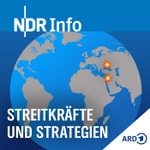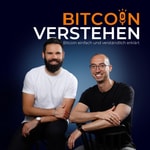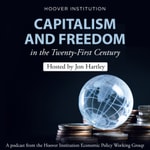Last Week on Earth with GARI – Details, episodes & analysis
Podcast details
Technical and general information from the podcast's RSS feed.

Last Week on Earth with GARI
Global Arena Research Institute
Frequency: 1 episode/33d. Total Eps: 42

Where technology, science, politics, economy & society meet - think, learn and be entertained a little along the way! Interviews, discussions and latest topics & events that you should know about! GARI is a research institute that uses advanced technology, such as AI with Big Data, to visualise, understand and create the ability to manage globalisation. Your host is GARI Executive Director Odessa Primus.
Recent rankings
Latest chart positions across Apple Podcasts and Spotify rankings.
Apple Podcasts
🇬🇧 Great Britain - techNews
18/09/2024#94🇬🇧 Great Britain - techNews
17/09/2024#68🇬🇧 Great Britain - techNews
16/09/2024#51
Spotify
No recent rankings available
Shared links between episodes and podcasts
Links found in episode descriptions and other podcasts that share them.
See all- https://www.esa.int/
118 shares
- https://www.weforum.org/
69 shares
- https://www.globari.org/
57 shares
RSS feed quality and score
Technical evaluation of the podcast's RSS feed quality and structure.
See allScore global : 52%
Publication history
Monthly episode publishing history over the past years.
Society & Politics: Should Disorder Be the New Normal? - Next 100 series
Episode 42
jeudi 1 août 2024 • Duration 27:37
In this podcast, we explore whether it's possible to augment stability and safeguard freedom in liberal democracies amidst rapid socio-political changes and growing extremism across the ideological spectrum. We assess the shifting dynamics within developed democracies of the Euro-Atlantic space, where increasing activism at both ends of the political spectrum complicates the search for a moderate political middle. The discussion delves into the complexities and unprecedented pace of social and political changes, examining their implications for governance amidst significant policy challenges, such as digital and environmental transformations, cultural debates, and migration issues. Additionally, we consider the effects of polarization, opportunism, and populism on effective governance, exploring whether this seeming disorder can be managed or even reversed, and what strategies might stabilize these trends in the short and long term.
Guests:
Hans Pung, President of RAND Europe
Hans Pung is President of RAND Europe, a not-for-profit public policy research organization that helps improve policy and decision-making through research and analysis. Pung joined RAND as a policy analyst in 2002 and continues to lead and deliver research projects, particularly around industrial economics and security policy issues. Before joining RAND, Pung served as an engineer officer in the United States Army with responsibility for logistics, personnel, and operations and overseas service in the United Kingdom, South Korea, and Germany. His recent projects include Cost Modeling and Skills Analysis, European Defense Industrial Base Analysis, Future UK Military Capability Requirements, Improving Counter-Violent Extremism Intervention.
Nestor Maslej, AI Index Research Manager, Stanford Institute for Human-Centered AI
Nestor Maslej is a Research Associate at Stanford’s Institute for Human-Centered Artificial Intelligence (HAI). In this position, he uses a combination of quantitative and qualitative methodologies to conduct research for the AI Index and Global AI Vibrancy Tool. Nestor also leads research projects that study AI in the context of technical advancement, ethical concerns and policymaking. In developing tools that track the advancement of AI, Nestor hopes to make the AI space more accessible to both policymakers and citizens. His work is also oriented towards building knowledge about AI in a way that facilitates more productive dialogues surrounding its future and can lead to its development in ethically responsible ways. Prior to joining HAI, Nestor worked in Toronto as an analyst in several startups.
Elizabeth Nelson, Co-Founder, Head of Innovation & Content Smart Building Collective
The author of The Healthy Office Revolution, Elizabeth C. Nelson is a researcher, writer, and Co-Founder of the Smart Building Collective | Certification. She stands on the review board for Academic publications including Nature's Digital Medicine, Journal of Medical Internet Research (JMIR), and Plos One. Her PhD in biomedical engineering focuses on our complex relationship with technology and a better way of living and working.
Supported by: International Visegrad Fund
If you want better insights into challenges and decisions you or your business are facing, GARI’s analytical services are of unmatched complexity and high accuracy - whether your questions are on the green energy transition, trade and supply chains, or political and security related - contact us for a free consultation and see how you can optimise your decision-making.
www.globari.org
@LinkedIn
@GARInstitute) / Twitter
The Yin and Yang of the Digital Century with Sebastian Hallensleben and Tony Curzon Price - Next 100 series
Episode 41
mercredi 31 juillet 2024 • Duration 23:33
In this episode, we discuss navigating the dualities of the digital economy amidst rising entropy and the unexpected effects of regulations. Staying a tech optimist can feel challenging. The past decade of rapid digitalization has improved interactions between citizens and governments, amplified marginalized voices, and increased social and economic interconnectedness. However, these benefits aren't equally distributed. Issues like data commodification, privacy concerns, and societal pathologies from constant smartphone use have permeated societies, possibly irreversibly. The increase in societal entropy leads to disorder and uncertainty, impacting different groups unevenly. As a result, policies and regulations often struggle to succeed and may have unintended consequences, potentially fueling the erosion of democratic societies.
Guests:
Sebastian Hallensleben
Head of Digitalisation and AI; Head of Strategic Technology Area "Digital Trust", VDE | Co-Chair, OECD ONE AI; UNESCO AI Ethics implementation expert group
Dr. Sebastian Hallensleben, Chair of CEN-CENELEC JTC 21 shaping European AI standards for EU regulation, also contributes to the EU StandICT program and leads the Trusted Information working group. He co-chairs OECD ONE.AI's classification and risk assessment group and holds roles in AI committees at IEC, Council of Europe, and UNESCO. Additionally, he heads Digitalisation and AI at VDE, overseeing new product/service development and providing guidance to the German parliament, federal ministries, and the European Commission. His focus includes AI ethics, generative AI impact, privacy-preserving trust infrastructures, and AI quality characterization. Previously, he facilitated dialogues between academia, industry, and policymaking and worked on international infrastructure projects. With a PhD in physics, he began his career in IT development and solutions architecture in the financial and telecom sectors. He holds an undergraduate degree in physics from the University of Tübingen and both his MSc and PhD degrees in physics are from the Unviersity of Sussexs.
Tony Curzon Price
Economic regulation, strategy, energy, net zero, antitrust, tech regulation, former sr advisor to UK PM
Tony Curzon Price Sits on the board of Ofgem, the UK's energy regulator with responsibility for achieving Net Zero. He has worked in Number 10, the Cabinet Office, the department of Business, Energy & Industrial Strategy and in the UK's antitrust authority. Before his civil service career, he founded Arithmatica, a silicon valley chip design company, and spent 5 years building the company in the Bay Area; he was editor-in-chief of the UK political website openDemocracy, where transformed openDemocracy into a not-for-profit editors’ cooperative for comment, analysis and investigation. He wrote his PhD on game theory and market design with Ken Binmore at UCL.
Supported by: International Visegrad Fund
International Visegrad FundEstablished by the governments of the Visegrad Group countries to promote regional cooperation.
Disclaimer: This post contains affiliate links. If you make a purchase, I may receive a commission at no extra cost to you.
If you want better insights into challenges and decisions you or your business are facing, GARI’s analytical services are of unmatched complexity and high accuracy - whether your questions are on the green energy transition, trade and supply chains, or political and security related - contact us for a free consultation and see how you can optimise your decision-making.
www.globari.org
@LinkedIn
@GARInstitute) / Twitter
Stakeholder Capitalism with Sibylle Barden
Episode 32
mercredi 24 mai 2023 • Duration 49:06
Sibylle Barden is an author and SDG and ESG strategist. She is an early champion of Stakeholder Capitalism. Her latest political novel „The Honeyguide“ was selected by the Frankfurt Book Fair as “one of 8 revolutionary books recommended for film adaptation”. Your host for this episode is Michal Koran, the Founder of the Global Arena Research Institute. Enjoy subscribe and share!
- Stakeholder capitalism - what is it?
- Regions are developing or even stagnating unevenly - despite all the funds and strategies - creating a divisive environment in Europe
- Klaus Schwab's “great reset”
- 200 big global players committed to the ESGs and SDGs
- Biodiversity and climate change
- Almost a million plant and animal species to become extinct in the coming decades
- Issue of taxation - corporations to pay their fair share
- Call for a global tax system?
- ESG is not just there for the planet, it's a new business model
- Clean supply chains
- More regulation and measuring
"The world of tomorrow was yesterday" - Michal Koran
https://sibyllebarden.com/
https://www.linkedin.com/in/sibylle-barden/
Supported by: International Visegrad Fund
If you want better insights into challenges and decisions you or your business are facing, GARI’s analytical services are of unmatched complexity and high accuracy - whether your questions are on the green energy transition, trade and supply chains, or political and security related - contact us for a free consultation and see how you can optimise your decision-making.
www.globari.org
@LinkedIn
@GARInstitute) / Twitter
The Metaverse with Claudia May Del Pozo
Episode 31
mardi 16 mai 2023 • Duration 30:33
All there is to know about the metaverse with Claudia May del Pozo, Executive Director of the Eon Resilience Lab, under C Minds, a women-led action tank that works at the intersection of digitalization, new technologies, and society with a strong focus on Latin America. We’re going to be chatting about the metaverse.
- monopoly on metaverse? or utopian version built on blockchain?
- when will we have a metaverse?
- next stage of social media
- problems:
- accessibility
- inclusion
- privacy and security
- uses of virtual reality
Questions posed:
- What is the metaverse, and how is it different from virtual reality or augmented reality?
- How do you envision the metaverse evolving in the coming years, and what impact do you think it will have on our daily lives?
- What ethical considerations should be taken into account when designing and implementing the metaverse, particularly with regards to data privacy and security?
- What is being done so that the metaverse is accessible to all, regardless of their socioeconomic background or geographic location?
- How can the metaverse be used to promote social and environmental causes, and what are some examples of this in action?
- What role do you see governments playing in regulating the metaverse, and what challenges do you think they will face in doing so?
https://mx.linkedin.com/in/claudiamdelpozo/en
If you want better insights into challenges and decisions you or your business are facing, GARI’s analytical services are of unmatched complexity and high accuracy - whether your questions are on the green energy transition, trade and supply chains, or political and security related - contact us for a free consultation and see how you can optimise your decision-making.
www.globari.org
@LinkedIn
@GARInstitute) / Twitter
The Progress of AI: AI Index Report 2023 with Nestor Maslej, Stanford HAI
Episode 30
lundi 24 avril 2023 • Duration 39:21
Today’s guest is Stanford Institute of Human Centered AI’s Nestor Maslej here to chat about this year’s AI Index Report - this is the second time we’re here together and I’d highly recommend listening to last year’s episode with Nestor on the 2022 Report. What are the trends, opportunities and challenges in AI from this last year?
- AI is being used to tangibly increase scientific advancement in energy
- Tricking chat gpt into building a dirty bomb or listing pirated movie websites
- Humanity faces the challenge of finding a way to manage the risks associated with artificial intelligence while ensuring that the benefits are shared by everyone.
- Top AI trends this year, compared to last year
- Career advice 2013 vs 2023 - 2013: “study computer science that is the future instead of being, say, a welder”, to 2023: “go back to being a welder, AI is going to replace all the computer science jobs”
- Generative AI seems to be going after creatives
- How much money is AI generating?
- AI ethics on the rise
- Public Opinion on AI
- When will we get to Artificial General intelligence?
Listen to last year’s episode with Nestor on the 2022 AI Index Report: https://www.buzzsprout.com/1477957/10744662
Nestor Maslej: https://www.linkedin.com/in/nestor-maslej-b565b779/
AI Index Report: https://aiindex.stanford.edu/report/
Nestor Maslej, Loredana Fattorini, Erik Brynjolfsson, John Etchemendy, Katrina Ligett, Terah Lyons, James Manyika, Helen Ngo, Juan Carlos Niebles, Vanessa Parli, Yoav Shoham, Russell Wald, Jack Clark, and Raymond Perrault, “The AI Index 2023 Annual Report,” AI Index Steering Committee, Institute for Human-Centered AI, Stanford University, Stanford, CA, April 2023.
Your host of Last Week on Earth with GARI: Odessa Primus: https://www.linkedin.com/in/odessa-primus/
Supported by: International Visegrad Fund
If you want better insights into challenges and decisions you or your business are facing, GARI’s analytical services are of unmatched complexity and high accuracy - whether your questions are on the green energy transition, trade and supply chains, or political and security related - contact us for a free consultation and see how you can optimise your decision-making.
www.globari.org
@LinkedIn
@GARInstitute) / Twitter
Chat GPT, Destination Earth & progress of science with Peter Bauer of ECMWF
Episode 29
jeudi 13 avril 2023 • Duration 49:12
We chat today about chat GPT, Destination Earth as well as the changing approach to discovery and the advancement of science and technology. Enjoy, subscribe and share!
Destination Earth (DestinE), is an ambitious initiative to create a digital twin – an interactive computer simulation – of our planet to empower climate change adaptation and to prevent environmental degradation.
As extreme weather becomes increasingly frequent and changes in climate more pronounced, there is an urgent need to forecast these events with even greater accuracy, to predict their impact on the environment, life and property.
Using an unprecedented amount of data, innovative Earth system models and cutting-edge computing, Destination Earth will allow users to explore interactively the different components of the Earth system and natural and human-induced change. They will be able and to look at the past and present and to test and develop future scenarios.
ECMWF, the European Space Agency (ESA) and the European Organisation for the Exploitation of Meteorological Satellites (EUMETSAT) are the three organisations entrusted by the EU to achieve this unprecedented endeavour for climate, weather and computing sciences.
By pushing the limits of computing and climate sciences, DestinE is a cornerstone of the European Commission’s efforts to boost Europe’s digital capabilities and the Green Deal actions on climate change and to prevent environmental degradation.
The first phase of the programme – its initial implementation phase – will be completed by June 2024. It will focus on configuring, deploying and demonstrating the initial infrastructure building blocks that will support Destination Earth in its future phases.
Peter’s current role at ECMWF (the European center for medium ranged weather forecasting) is as Director of Destination Earth. Destination Earth is an ambitious initiative of the European Commission to develop a highly accurate digital twin, or replica, of Earth to to monitor and predict the interaction between natural phenomena and human activities. Key to predicting the effects and building resilience to climate change
Peter had previously founded and led the ECMWF Scalability Programme which addresses the challenges of operating complex Earth system models on future supercomputing facilities.
As Head of the Satellite Section, he has been coordinating all scientific and technical activities related to the efficient use of space-borne observations of the atmosphere, oceans, land and the cryosphere.
https://www.linkedin.com/in/peter-bauer-712677109/
https://www.ecmwf.int/en/about/what-we-do/environmental-services-and-future-vision/destination-earth
https://www.linkedin.com/in/odessa-primus/
https://www.globari.org/
Supported by: International Visegrad Fund
If you want better insights into challenges and decisions you or your business are facing, GARI’s analytical services are of unmatched complexity and high accuracy - whether your questions are on the green energy transition, trade and supply chains, or political and security related - contact us for a free consultation and see how you can optimise your decision-making.
www.globari.org
@LinkedIn
@GARInstitute) / Twitter
This world isn’t for Europe: Chinese reforms and global decoupling - the Last Week on Earth
Episode 28
mardi 21 mars 2023 • Duration 24:37
We’re excited to launch a new series of shorter podcast episodes where we give you a deeper look into what is happening right now globally and regionally and GARI’s insights into it. GARI’s digital twin of the globalised world enables us to do complex analyses and have valuable insight into topics we deal with. Today we delve into the changing landscape of global interconnectedness, regionalization of trade, investment, technological exchange and a close look at China, Russia and Europe.
With your hosts: GARI’s Executive Director Odessa Primus and Founder Michal Koran and this is Last Week on Earth with GARI
- Global decoupling until now has been pretty foggy, however, this is changing and we’re now seeing a world that is deeply fragmented - in which sectors is this most prominent and what should we be looking out for?
- Europe will have difficulty finding its place in the sun in this new world - what are the circumstances for Europe and how does it differ from other regions?
- Is Europe responding to new trends, challenges and opportunities? Why is Europe still lagging and in which areas is it most urgent?
- How would you describe the new trajectories of Russia and China since the invasion?
- What are China and Russia doing to diversify their trade and how does it compare to Europe’s efforts?
- What are the regional differences in Europe and how does that impact the politics, economics and society within the regions and Europe as a whole?
- What should Europe be paying attention to right now and what should be done?
If you want better insights into challenges and decisions you or your business are facing, GARI’s analytical services are of unmatched complexity and high accuracy - whether your questions are on the green energy transition, trade and supply chains, or political and security related - contact us for a free consultation and see how you can optimise your decision-making.
www.globari.org
@LinkedIn
@GARInstitute) / Twitter
(Artificial) Intelligence, law and geopolitics with Joanna Bryson
Episode 27
vendredi 15 juillet 2022 • Duration 37:35
Today we’re chatting with intelligence expert Joanna Bryson on:
- The definition of intelligence, artificial and natural?
- AI as an efficiency tool
- Putting AI products into ordinary product law
- How do we perceive the global bi-polar AI situation?
- Why Google and Apple don’t patent that much
- China, Russia, Iran, the EU - who, what, and why?
with degrees in social and computer sciences from Chicago, Edinburgh, and MIT, Bryson’s research appears in venues from Reddit to Science, and she advises companies, governments, transnational agencies, and NGOs globally, particularly in AI policy. Since February 2020, Joanna has been a Professor of Ethics and Technology at Hertie School, a governance university in Berlin.
Enjoy, share and subscribe!
https://globari.org/podcast
https://www.linkedin.com/company/global-arena-research-institute/
https://globari.org/
Supported by: International Visegrad Fund
If you want better insights into challenges and decisions you or your business are facing, GARI’s analytical services are of unmatched complexity and high accuracy - whether your questions are on the green energy transition, trade and supply chains, or political and security related - contact us for a free consultation and see how you can optimise your decision-making.
www.globari.org
@LinkedIn
@GARInstitute) / Twitter
New perceptions of the European Union, & it's AI regulation and innovation approaches
Episode 26
lundi 11 juillet 2022 • Duration 41:08
Today we are welcoming back Sebastian Hallensleben to talk about the new perception of the EU, the imprecision of the Commissions regulations on AI, the level of technological understanding amongst EU commissioners, the challenges that poses, funding innovation and more.
- How does interdisciplinary and inter-sector dialogue work in the EU?
- The European Commission is working on AI regulation, and the regulations are quite imprecise but will eventually have a significant impact on the way we handle AI in Europe
- In European politics, there are parties that ultimately strive to work towards some sort of compromise and parties that don’t
- The debates happen on different levels because of the different levels of technological know-how. Corporations try to come in and explain AI which can affect European policy-making sovereignty
- If you look at history, despite the many faults the European Union has, it has always been a success model
- Europe has to be cautious of the uncertainties of other countries, such as the US or Russia
- The EU discusses autonomy and sovereignty as a geo-strategic balance
- Timing of AI regulation is important
- The EU needs to have a discussion about its own resilience and its institutions. What happens if a bad actor comes into play?
- The importance of democratic discourse. Government is not just a “service provider”. The government is shaped by its citizens
- Biggest challenge right now is building an infrastructure of trust in the digital space. How can I avoid being manipulated by AI entities? Setting up privacy and identity protection. Government shouldn’t run these protections but sponsor them.
- The need for funding for new ideas in the digital space
Sebastian Hellensleben: https://www.linkedin.com/in/sebastianhallensleben/
GARI: https://globari.org/
Supported by: International Visegrad Fund
If you want better insights into challenges and decisions you or your business are facing, GARI’s analytical services are of unmatched complexity and high accuracy - whether your questions are on the green energy transition, trade and supply chains, or political and security related - contact us for a free consultation and see how you can optimise your decision-making.
www.globari.org
@LinkedIn
@GARInstitute) / Twitter
2022 AI Index Report by Stanford Institute for Human-Centered AI with Nestor Maslej
Episode 25
lundi 6 juin 2022 • Duration 51:53
2022 AI Index Report by Stanford Institute for Human-Centered AI
The AI Index is an independent initiative. The annual report tracks, collates, distills, and visualizes data relating to artificial intelligence, enabling decision-makers to take meaningful action to advance AI responsibly and ethically with humans in mind.
The latest edition includes data from a broad set of academic, private, and nonprofit organizations as well as more self-collected data and original analysis than any previous editions, including an expanded technical performance chapter, a new survey of robotics researchers around the world, data on global AI legislation records in 25 countries, and a new chapter with an in-depth analysis of technical AI ethics metrics.
Our guest today, Nestor Maslej is a Research Associate at the Institute and worked directly on the report.
We discuss many of the marvelous examples of how AI is used around the globe as well as trends, breakthroughs and difficulties AI development has experienced in the last year.
“If we are to get the most out of AI, to build AI systems that are capable of really enriching humanity’s potential, then we’re going to have to figure out a way to build them so they align with fundamental human values”
- What is "human-centered AI"?
- Unexpected consequences of AI development
- How is the AI Index Report created?
- Problems of AI - like image recognition
- Trends in AI in the past 5 years - what has changed structurally?
- What to say at a dinner party if AI comes up - your spiel
- exploring 3 big AI trends:
1. AI is getting faster and cheaper
2. Data is becoming increasingly necessary for building the best IA systems
3. legislative interest in AI is skyrocketing - Top countries passing AI legislature
- The big question: When can we develop AI systems that are capable of thinking like a human can think?
Global Arena Research Institute is an independent, non-partisan research organisation that combines the most advanced methods of AI-driven data, scientific and other artificial reasoning capabilities, elevating data science into completely new levels of opportunity. Our goal is to provide unprecedented insights into the nature, impact, and management of globalization in order to improve institutional and governmental as well as business, energy and other sectors’ decision making. Our mission is to make the most of organically connecting AI-level reasoning capacities with the human-level critical reasoning capacities for the sake of a better future.
With your hosts Odessa Primus and Michal Koran
Supported by: International Visegrad Fund
If you want better insights into challenges and decisions you or your business are facing, GARI’s analytical services are of unmatched complexity and high accuracy - whether your questions are on the green energy transition, trade and supply chains, or political and security related - contact us for a free consultation and see how you can optimise your decision-making.
www.globari.org
@LinkedIn
@GARInstitute) / Twitter









